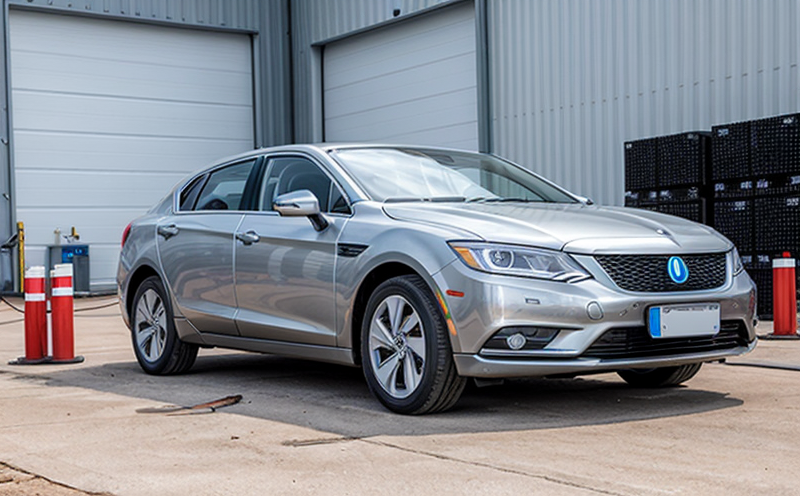UL 2271 NiMH Battery Testing for Light Electric Vehicle Applications
The demand for sustainable and efficient transport solutions has led to a significant increase in the development of light electric vehicles (LEV). Among these, nickel-metal hydride (NiMH) batteries have become a preferred choice due to their high energy density, long cycle life, and relatively low cost. The UL 2271 standard provides specific requirements for the safety testing of NiMH batteries intended for use in LEVs.
UL 2271 is designed to ensure that these batteries meet stringent electrical and mechanical safety standards, which are critical for protecting both users and the environment. This service focuses on providing comprehensive testing solutions tailored to the unique needs of this sector. Our state-of-the-art facility employs advanced equipment and expert staff to conduct thorough assessments ensuring compliance with UL 2271.
Our team specializes in handling various types of NiMH batteries used in LEVs, including those found in electric bicycles, scooters, and other personal transport devices. The testing process involves multiple stages aimed at evaluating the electrical performance, thermal stability, structural integrity, and overall safety characteristics of these components under both normal operating conditions and extreme stress scenarios.
One key aspect of our service is ensuring that all tests are conducted in accordance with UL 2271 guidelines to guarantee accurate results. This includes conducting detailed inspections before testing begins, calibrating instruments accurately, and following precise procedures throughout each phase of the evaluation process. By doing so, we provide clients with reliable data they can trust when making decisions about product design improvements or regulatory compliance.
Another important feature is our ability to simulate real-world operating conditions during tests. This allows us to identify potential issues early on in development cycles while also providing valuable insights into how different factors such as temperature fluctuations, vibration levels, and charging rates affect battery performance over time.
In addition to meeting regulatory requirements, we recognize that staying ahead of industry trends is crucial for maintaining competitive advantage within this rapidly evolving market. Therefore, our team continuously monitors emerging technologies related to LEV batteries and incorporates new methodologies into our testing protocols whenever appropriate.
Applied Standards
The primary standard applied in this service is UL 2271, which covers the safety requirements for nickel-metal hydride (NiMH) batteries used in light electric vehicles. This document specifies various tests that must be performed on these batteries to ensure they meet specific performance criteria related to electrical characteristics, mechanical strength, and thermal stability.
- Testing for short circuit protection
- Evaluation of overcharge response
- Inspection of internal resistance measurement
- Analysis of self-discharge rate determination
- Assessment of leakage current evaluation
- Verification of thermal runaway prevention measures
- Evaluation of mechanical impact resistance
- Testing for vibration tolerance levels
To further support our clients' compliance efforts, we also follow other relevant standards such as ISO/IEC 17025:2017, which ensures the competence and capability of our laboratory. Our adherence to these international norms guarantees that all test results are accurate, repeatable, and reliable.
Benefits
- Enhanced Product Safety: By ensuring strict compliance with UL 2271, we help eliminate risks associated with potential failures or malfunctions in NiMH batteries used in LEVs. This not only enhances user safety but also reduces the likelihood of recalls and product liability lawsuits.
- Improved Regulatory Compliance: Our thorough testing ensures that your products meet all necessary regulatory requirements, helping you avoid costly delays during certification processes. This saves time and resources while increasing market access opportunities globally.
- Innovation Support: With our expertise in simulating real-world conditions, we can provide valuable feedback to aid in the continuous improvement of battery designs. This allows for more efficient development cycles and faster introduction of new products to market.
- Cost Efficiency: Early identification of defects through comprehensive testing helps prevent costly rework or redesign efforts later in the production process. Additionally, our services offer competitive pricing that aligns with your business goals without compromising quality standards.
In summary, by leveraging our UL 2271 NiMH battery testing capabilities, you gain access to a suite of benefits designed to enhance product safety, streamline compliance processes, foster innovation, and optimize cost structures—all critical factors for success in today's competitive marketplace.
Competitive Advantage and Market Impact
The ability to demonstrate robust adherence to UL 2271 standards can significantly contribute to a company's reputation as a leader in quality assurance within the LEV industry. Here are some ways this service can help your organization achieve greater market share:
- Differentiation from Competitors: Offering comprehensive UL 2271 testing demonstrates commitment to excellence, setting you apart from competitors who may not provide comparable services.
- Better Customer Trust: Ensuring that your products comply with stringent safety standards builds trust among consumers and stakeholders, which is essential for long-term relationships.
- Innovation Opportunities: Our detailed analysis of test results can uncover areas where improvements could be made, opening up avenues for product differentiation through innovation.
- Increased Sales Potential: Meeting all relevant standards increases the likelihood that your products will pass certification requirements quickly and easily. This accelerates time-to-market and maximizes sales potential.
Beyond these immediate benefits, there are broader implications for market impact. By maintaining high safety standards across all aspects of product development, manufacturers contribute positively to public health and environmental sustainability. This positive reputation can extend beyond individual products into broader brand perception, potentially leading to increased consumer loyalty and higher overall sales volumes.





